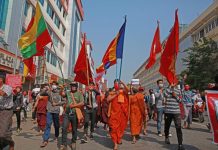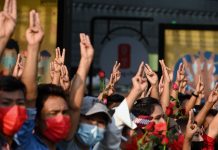
G7 calls on China not to impose a national security law on Hong Kong, according to a joint statement of foreign ministers.
The foreign ministers of G7 finds China's imposition of the national security legislation "not in conformity" with either the Hong Kong Basic Law, the region's mini-constitution, or its duties under the "legally-binding, UN-registered" Sino-British Joint Declaration.
Hong Kong remained a British colony for over 150 years before it was given back to China in 1997 under a framework that gave its citizens rights and liberties. These include an independent judiciary, which is not enjoyed by the mainland.
"The proposed national security law would risk seriously undermining the 'One Country, Two Systems' principle and the territory's high degree of autonomy," the foreign ministers of Germany, United States, Canada, Japan, France, the United Kingdom, Italy, and the EU's High Representative said in the statement, which was issued late on Wednesday.
"We strongly urge the Government of China to re-consider this decision," it said.
National security law
The draft legislation of the national security law was introduced during the annual session of China’s National People’s Congress (NPC).
The NPC said it was “exercising the power (of) the constitution to establish and improve at the state level a legal framework and an enforcement mechanism for safeguarding national security in Hong Kong,” said Zhang Yesui, spokesperson for the third session of the 13th National People’s Congress, during a press conference on Thursday evening. “This is highly necessary.”
News agency Xinhua reported that China has been “firmly implementing the principles of ‘one country, two systems,’ ‘the people of Hong Kong governing Hong Kong,’ and a high degree of autonomy” since the return of Hong Kong to Beijing. The news media was disclosing an explanatory document from Wang Chen, vice chairman of the Standing Committee of the NPC.
“The practice of ‘one country, two systems’ has achieved unprecedented success in Hong Kong,” Xinhua stated regarding the document.
“There is no need for us to worry because in the last 23 years whenever people worried about Hong Kong’s freedoms of speech and freedoms of expressions and protest, time and again Hong Kong has proven that we uphold and preserve those values,” Hong Kong leader Carrie Lam said.
“I think the best thing is to see the legislation in front of us, and to understand why at this point in time Hong Kong needs this piece of legislation, for the bigger benefit of the great majority of Hong Kong people.”
Reactions of world leaders
World leaders expressed stance on the national security law in Hong Kong imposed by China.
White House National Security Advisor Robert O’Brien said China may face US sanctions due to the national security law it proposed for Hong Kong.
In fact, President Donald Trump said the US will remove Hong Kong’s special treatment as a customs and travel zone from the rest of China.
“China claims it is protecting national security, but the truth is that Hong Kong was secure and prosperous as a free society. Beijing’s decision extends the reach of China’s security apparatus into what was once a bastion of liberty,” said Trump.
Meanwhile, in a previous joint statement, the US, UK, Australia, and Canada said they have “deep concern” regarding the national security law imposed on Hong Kong.
“Hong Kong has flourished as a bastion of freedom. The international community has a significant and long-standing stake in Hong Kong’s prosperity and stability,” it said.
“Direct imposition of national security legislation on Hong Kong by the Beijing authorities, rather than through Hong Kong’s own institutions as provided for under Article 23 of the Basic Law, would curtail the Hong Kong people’s liberties.” The Basic Law is Hong Kong’s mini constitution.
According to the joint statement, the law “will exacerbate the existing deep divisions in Hong Kong society” and “does nothing to build mutual understanding and foster reconciliation within Hong Kong.”






